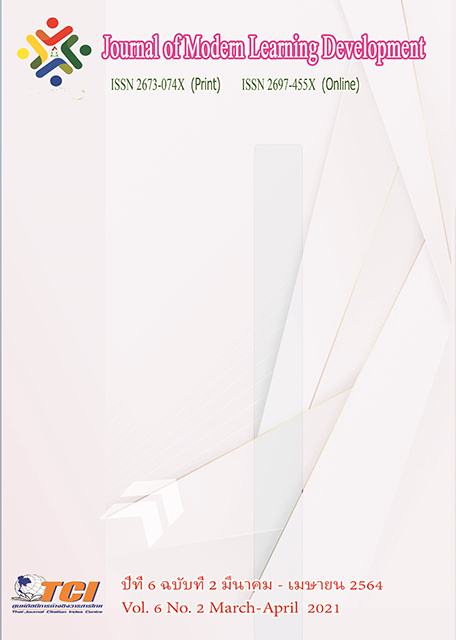Creative Management of Cultural Heritage with Participation of Mekong Community
Main Article Content
Abstract
This research aimed to 1) to build knowledge of history, cultural and traditions of the Mekong Community 2) to study a creative management of cultural heritage with participation of mekong community 3) to create awareness of conservation, preserve the cultural heritage and traditions in the mekong communities. This research is a qualitative by in-depth interviews with 36 key informants and organizing projects for community conservation consciousness 30 person, data analysis using contextual content analysis techniques.
The research results were found that : 1. knowledge of history (1) history of Luang Pho Phra Sai, Luang Pho Ong Tue, Luang Pho Phra Siang, all 3 of them have a long history of the Mekong (2) the tradition of pouring water from Luang Pho Phra Sai, Luang Pho Ong Tue, Luang Pho Phra Siang (3) Boun Bang Fai, is the 6th month of merit or Boun Bang Fai for people of the Mekong, called "Bork Than Boo Cha Fai". 2. model of creative management of cultural heritage with participation of mekong community. Through the following formats: (1) by the participation of the Mekong communities through a driving force by local administrative organizations in the area (2) by Participation of the Mekong community by the government (3) by participation of the Mekong community by temples and villagers. 3. building awareness of conservation preserve the cultural heritage and traditions in the Mekong community (1) article contest on raising awareness in conservation maintain culture and tradition (2) conservation conscious slogans contest preserve the culture and traditions (3) listening to ideas about conservation maintain culture and tradition.
Article Details
References
กรมศิลปากร. (2543). วัฒนธรรมพัฒนาการทางประวัติศาสตร์ เอกลักษณ์และภูมิปัญญาจังหวัดหนองคาย.กรุงเทพมหานคร: ครุสภาลาดพร้าว.
กรมส่งเสริมวัฒนธรรม. (2554). มรดกภูมิปัญญาทางวัฒนธรรมของชาติ ประจำปีพุทธศักราช 2554.กรุงเทพมหานคร: สยามไทยมุง มรดกวัฒนธรรม.
ปรัชมาศ ลัญชานนท์. (2554). การจัดการมรดกทางวัฒนธรรมโดยการมีส่วนร่วมของชุมชนในเมืองท่องเที่ยวเชิงประวัติศาสตร์ : กรณีศึกษาชุมชนในเมืองเชียงใหม่. การวางแผนภาคและเมืองดุษฎีบัณฑิต (ผ.ด.). สถาปัตยกรรมศาสตร์. บัณฑิตวิทยาลัย: จุฬาลงกรณ์มหาวิทยาลัย.
สุดแดน วิสุทธิลักษณ์ และคณะ. (2555). รายงานการวิจัยต้นแบบการท่องเที่ยวเชิงสร้างสรรค์ Creative Tourism Model. กรุงเทพมหานคร: มหาวิทยาลัยธรรมศาสตร์.
สำนักงานพัฒนาชุมชนอำเภอเมืองหนองคายจังหวัดหนองคาย. (2562). ประวัติเมืองหนองคาย. (ออนไลน์). สืบค้นเมื่อ 20 มกราคม 2564.แหล่งที่มา: https://district.cdd.go.th/muang-nongkhai/about-us/%E0%B8%9B%E0%B8%A3%E0%B8%B0%E0%B8%A7%E0%B8%B1%E0%B8%95%E0%B8%B4%E0%B8%84%E0%B8%A7%E0%B8%B2%E0%B8%A1%E0%B9%80%E0%B8%9B%E0%B9%87%E0%B8%99%E0%B8%A1%E0%B8%B2/
โอชัญญา บัวธรรม และลินจง โพชาร. (2559). ความสำคัญทางวัฒนธรรมของแหล่งท่องเที่ยวเชิงวัฒนธรรมในจังหวัดหนองคาย และนครหลวงเวียงจันทน์ สปป.ลาว. วารสารรมยสาร คณะมนุษยศาสตร์และสังคมศาสตร์ มหาวิทยาลัยราชภัฏบุรีรัมย์. 14 (3), 167-175.
Stefan Ivanko. (2013). Modern Theory of Organization. Ljubljana and Portorož : Faculty of Public Administration University of Ljubljana, Slovenia.


